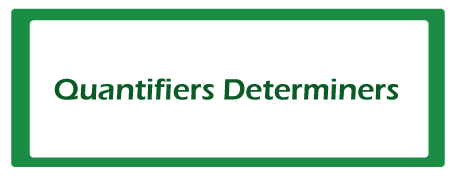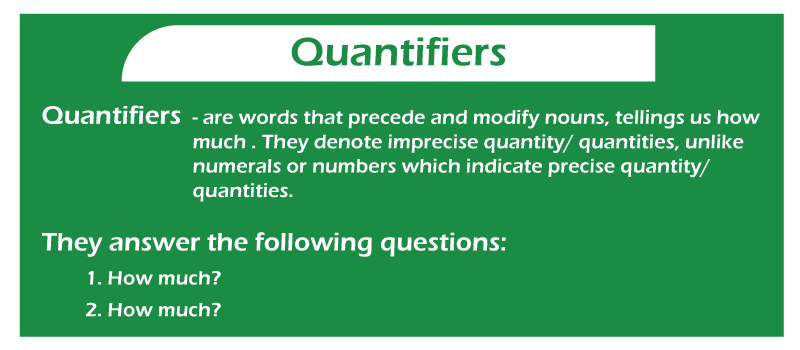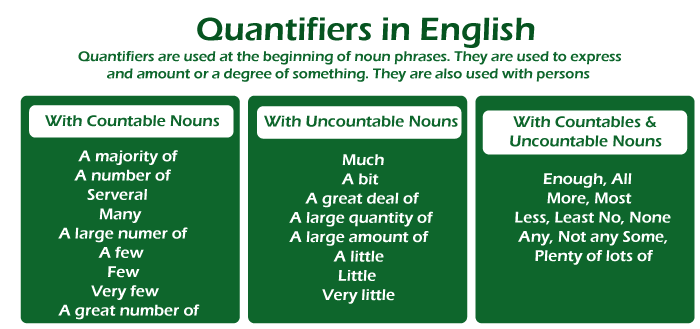Quantifiers DeterminersDeterminers alter nouns by imposing a restriction on them to indicate how particular or generalized they are. 
A determiner is frequently found at the start of noun phrases and functions as an adjective to alter nouns. On the other hand, a determiner is not mandatory for each and every noun phrase. These cannot be utilized in the predicative sense, that is, following the noun. Before plural nouns, a determiner may or may not be used. Adjective Vs DeterminerIf the adjectives are being used to characterize the noun, a determiner comes before them. Determiners and most adjectives appear in front of a noun and are frequently confused. This is incorrect because they do not fit in the same category. Only a few, but definitely not all, determiners function as adjectives. A determiner, unlike an adjective, is frequently required as a modifier in a sentence. Determiners and adjectives both serve the same purpose of altering a noun by providing additional information. However, they differ. For instance, a determiner shows whether the Noun is particular or communicates the Noun's place in reference to the speaker/writer, while an adjective specifies the Noun's qualities. Types of DeterminersDeterminers are classified into mainly four types: articles, demonstratives, possessives, and quantifiers. They are used to convey the clarity, place, ownership, and amount of a noun. Determiners are classified into two types: definite determiners and indefinite determiners. For example,
The majority of the terms that are used as determiners are also employed as pronouns. Furthermore, the possessive determiners (my, your, his, her, its, our, and their) and some other determiners (the, a, an, every, no, and other) cannot be used as pronouns. To use the latter as pronouns, use one (rather than an or an), each (rather than every), none (rather than no), and others (rather than other). QuantifiersA quantifier are the words or the phrases that communicates the quantity of the noun by denoting the number of objects or the amount of something. It comes before and alters the noun, which can be countable or uncountable. Quantifiers include all, many, much, most, one, some, a few, and a lot etc. Quantifiers determine the quantity of the subject. Quantifiers are often used to determine physical and psychological amounts for countable and uncountable nouns. For example: 'too much workload, "several pears,' many individuals, much anxiety, much work and effort, etc. 
Here are several examples:
Many, much, a little, a little of, a lot of, most, some, enough, any, few, several, not much, too much, so much, not so much, too many, not many, enough, and so on. Cardinal numbers include one, two, three, four and so on. Ordinal numbers- first, second, third, and so on. Consider the sentences below as examples. Uncountable nouns are quantified using quantifiers like as little, a little bit of, a lot of, a great amount of, and so on. Please read the below mentioned sentences as the examples :

Quantifiers such as few, several, a large number of, and so on should be used with countable nouns -
Some, plenty, any, a lot of, no, and other quantifiers can be employed with both countable nouns and uncountable nouns. As an example ,
Quantifiers - Countable and Uncountable
+ Noun Countable nouns refer to the objects that can be counted, such as a desk and two pens. Uncountable nouns are items that cannot be counted and only have a singular form, such as some furnishing or flower. Let us begin learning the concept with the quantifiers that represent enormous amounts. 1. Much, Many, A lot (of)We often use much, a lot (of) to allude to large amounts. Most often 'many' is employed for countable noun, 'much' for uncountable noun, and 'a lot (of)' for both countable noun as well as uncountable noun. In modern English, 'a lot (of)' is frequently used in affirmative statements rather than 'many' and 'much.' Here are a couple of such examples :
When we want to highlight a large amount, we can use the term 'so' in front of 'many' and 'much.' As an example :
2. A few, a little, a little bit (of)We can employ terms like 'a few' and 'a little' to refer to small quantities. 'A few' is mostly employed with countable nouns, whereas 'a little' is utilised with uncountable nouns. It is also permissible to use 'a little' with uncountable nouns, albeit this is more casual. Here are some of the examples :
We employ the terms' few' and 'little' without 'a to allude to a small quantity in a negative context. As an example :

3. Any, SomeWe often utilize the term 'some' and 'any' to mention to the plural noun or to an uncountable noun without specifying a number. In affirmatives, we use 'some,' while we use' any' in queries and negatives. Here are some examples :
EXCEPTIONS! There is an exception to this guideline or rule, as is customary in English. We frequently use 'some' rather than 'any' when making requests and proposals/ offers.
4. Enough, Plenty (of)The phrases' enough' and 'plenty' communicate the concept of a suitable quantity. Both words can be used with both countable and noncountable nouns. We use the phrase 'plenty (of)' to indicate that there is more than enough quantity or amount of something. As an example:
We use the word 'enough' to mean having or not having a sufficient amount. As an example:
5. Questions about QuantityWe employ ' how much ' or ' how many of anything' whenever we want to know how much' or 'how many'. Here are a few more examples :
When we question how much something costs, we also use 'how much'. As an example:
Example of Quantifier DeterminersQuantifiers for countable and uncountable nouns include:
Next TopicDeterminers Exercises
|
 For Videos Join Our Youtube Channel: Join Now
For Videos Join Our Youtube Channel: Join Now
Feedback
- Send your Feedback to [email protected]
Help Others, Please Share










